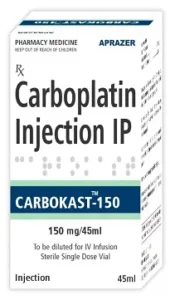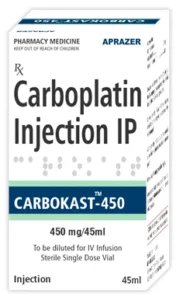Carboplatin Injection
Carboplatin Injection
Classification: Anticancer Injection
What is Carboplatin Injection?
Carboplatin injection is a platinum based anticancer medicine. It is used to treat multiple cancers and solid tumors, killing the cancer cells.
Uses of Carboplatin Injection
- • Ovarian cancers
- • Endometrial cancer
- • Head and Neck Cancer
- • Palliative care for recurrent cancer
- • Cancer of the esophagus
- • Non-small cell lung cancer
- • Lung cancer
- • Breast cancer
Carbokast 150mg (carboplatin injection) – Targeting Multiple Cancers
Carbokast 150 mg injection, manufactured by Aprazer Healthcare, is widely used in oncology settings and healthcare institutes to treat aggressive cancers like female malignancies. Carbokast is widely used to treat advanced cancer, or that which has degraded or failed after various other treatments.
It is formed in 2 strengths – Carbokast 150 mg and Carbokast 450mg
Aprazer Healthcare – Manufacturing India’s Top Pharma Exports
Aprazer Healthcare is the leading anticancer drug manufacturer. We manufacture standard medicines that are compliant with the highest health standards (WHO-GMP, EU-GMP).
We lead in global pharmaceutical export of anticancer medicines, with millions relying on our excellent and exceptional quality.
How does Carboplatin Injection work?
It damages or destroys cancer cell DNA by crosslinking strands, which causes inhibition of DNA and RNA formation. It causes cancer cell death.
Common side effects of Carboplatin Injection
Carboplatin impacts various body functions, including digestive functions, bone health, and blood profiles. It causes –
- • Nausea
- • Diarrhea
- • Weakness
- • Hair loss
- • Low energy levels
- • Abdominal pain
- • Nerve pain
Serious side effects of Carboplatin Injection
Most of the side effects caused by carboplatin injection are manageable, but some serious side effects can occur at higher doses and require immediate healthcare help.
- • Bone marrow suppression – The severity depends on the dose; higher doses cause a reduction in the formation of blood cells.
- • Risk of severe infections – It lowers the formation of platelets and increases the risk of opportunistic infections.
- • Kidney dysfunctions – high doses can cause severe effects on the kidneys leading to kidney failure.
- • Allergy or hypersensitive reaction – It can cause allergic and severe reactions in people with an allergy to the drug.
- • Hearing loss – It is caused by an increased dose, which can lead to permanent hearing loss.
- • Nerve Damage – cumulative doses can cause nerve damage, leading to tingling and numbness.
- • Liver dysfunctions – It can cause severe liver tissue injury in certain cases.
Warnings and Precautions while using Carboplatin Injection
It should not be used by breastfeeding and pregnant women. It should be given to people with an allergy or hypersentivity to drug components.
To be used cautiously in people with –
- • Renal disorders
- • Liver disease
- • Bleeding disorder
- • Hearing issues
- • Elderly patients
- • Bone marrow suppression
Handling Instructions
Carboplatin can be toxic to the skin; it should be used while wearing gloves. Wash your hands or the skin if it comes in contact. Aluminum or other metallic IV sets cause carboplatin to precipitate.
Storage
To be stored at refrigerator temperature (1-8 degrees Celsius). Do not freeze. Always protect from light and heat.
Administration Instructions
It should be administered by slow IV infusion. The reconstituted solution should be used immediately.
Drug Interactions
Certain drug interactions increase the risk of toxicity – Avoid combined use with –
- • Anticoagulants
- • Antibiotics
- • Phenytoin
- • Nephrotoxic drugs
- • Live vaccines
- • Immunosuppressant drugs


